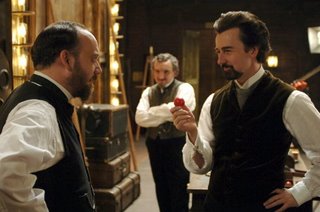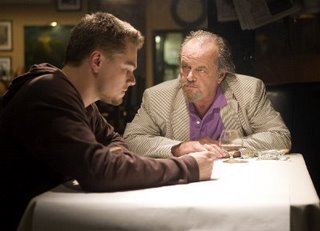 Idea: The empress of Austria's daughter, Antoine (Kirsten Dunst), is promised to the dauphin of France, Louis XVI (Jason Schwartzman). She leaves her life and family behind to become Marie Antoinette at Versailles. Marie struggles against her naiveté to fit in with French society (Rose Byrne, Shirley Henderson, Molly Shannon, Steve Coogan), please her father-in-law (Rip Torn) and his mistress (Asia Argento), and produce an heir.
Idea: The empress of Austria's daughter, Antoine (Kirsten Dunst), is promised to the dauphin of France, Louis XVI (Jason Schwartzman). She leaves her life and family behind to become Marie Antoinette at Versailles. Marie struggles against her naiveté to fit in with French society (Rose Byrne, Shirley Henderson, Molly Shannon, Steve Coogan), please her father-in-law (Rip Torn) and his mistress (Asia Argento), and produce an heir. Although I had been keeping with my policy to avoid reviews, I did know that writer-director Sophia Coppola's third offering was booed at Cannes. Further, my office mate announced to me that this was the worst movie he had ever seen. Now, I've seen a lot of movies. A comment like that makes it clear to me that he has not.
I liked both of Sophia's* other movies. I've watched The Virgin Suicides repeatedly. Part of what makes Sophia's movies work is her quiet and slow storytelling. It's not economical so much as it is hazy, lulling you into contemplative complacency like a cat lying in a shaft of sunlight. For Suicides and Lost in Translation, the deliberate pace works against the audience, blinding you to how invested in the story you've become. You're mesmerized.
Here, however, the very thing that made Sophia's movie work in the past has the opposite effect. Her protagonist barely speaks for the first twenty minutes, which is indicative of the minimalist dialogue and plot. Endless shots of sumptuous Laudrée cakes and gorgeous Manolo Blahnik shoes do not a story make.
Much like Wing Chun, I've seen a lot of Dunst movies without ever being certain that I like her . There certainly is a place for effervescence with an undertone of petulance, and I hold it possible that I want Dunst to be the person to fill that niche. She tries, but she's sort of lost here. I'm not even sure that I would blame Dunst - she nails Marie as an easily influenced kid in the wrong place at the wrong time, but Sophia doesn't give her a character to work with.
She neither gives her cousin much of a character, but somehow Schwartzman comes across as adorably and amusingly befuddled. To be honest, I would sit through it all again to see - and I swear this happened - an elephant flirt with Schwartzman.
adorably and amusingly befuddled. To be honest, I would sit through it all again to see - and I swear this happened - an elephant flirt with Schwartzman.
 adorably and amusingly befuddled. To be honest, I would sit through it all again to see - and I swear this happened - an elephant flirt with Schwartzman.
adorably and amusingly befuddled. To be honest, I would sit through it all again to see - and I swear this happened - an elephant flirt with Schwartzman.The problem lies with Sophia. Given the international success and acclaim for her sophomore effort (which she penned while trying to work this story out), she seems to have fallen into complacency herself. I counted seven different scenes with visible boom mics. Not in the film geek, I-spotted-one-in-the-reflection-off-a-toaster way. In the there's-one-above-the-actor's-head-right-now way. Budget restrictions aside, that's just lazy. Re-shoot, use a different shot, digitally edit that shit out.
The movie's not bad - just boring. I have no problems with the anachronisms, pop music included.** The movie lacks the emotional connection that made her other pictures palatable. There's little substance to weigh down the fluff. C
** There was one song that I hated. We will speak no more of that hideous thing.
Also, I agree with the Fug Girls. I would totally go see that movie.








